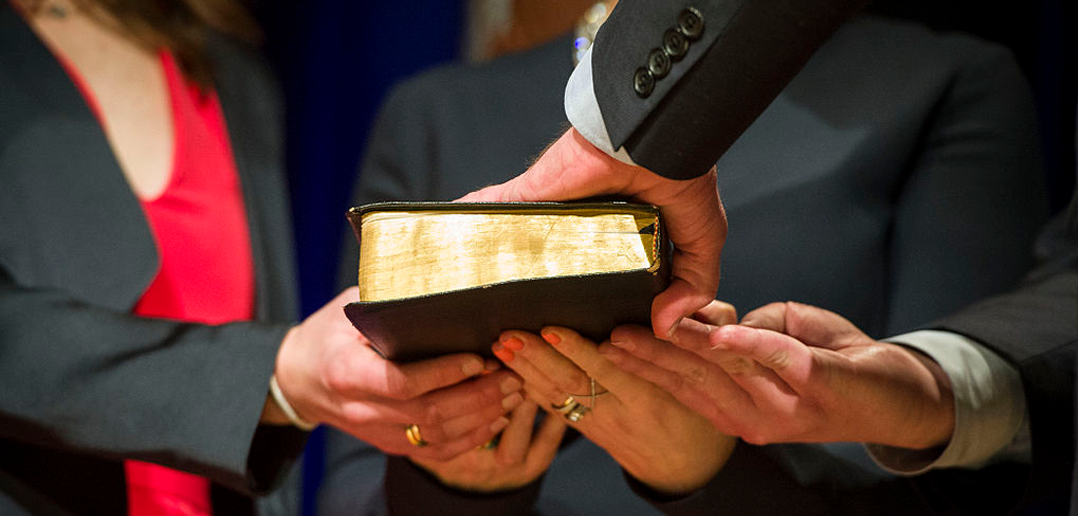
New York Times columnist Ross Douthat is a faithful Catholic who often writes about the Church. His latest column regarding the controversial Synod on the Family in Rome, “The Plot to Change Catholicism,” was strongly criticized in a letter to the editor by more than 50 signers, many of them theologians from Catholic colleges and universities.
But rather than answer or challenge Douthat’s observations, the signers pouted that “Mr. Douthat has no professional qualifications for writing on the subject.” In other words, only elite intellectuals in the ivory tower are allowed to comment on the Church.
It is a rich irony that most theologians at Catholic colleges refuse to tell students and parents whether they have obtained themandatum — a credential required by Canon 812 of the Catholic Church’s Code of Canon Law. The U.S. Conference of Catholic Bishops has issued guidelines concerning the mandatum, requiring professors to attest, “I am committed to teach authentic Catholic doctrine and to refrain from putting forth as Catholic teaching anything contrary to the Church’s magisterium.”
For the record, we have not been able to find a relevant canon that prohibits lay columnists from expressing their own observations about issues that the Church herself has put into the public square, with an invitation to openness and dialogue.
Instead of devoting their energies to eradicating from mainstream American journalism one of the few faithful Catholic voices, the academics who protested Mr. Douthat’s right to express an opinion should turn their energies to ensuring faithful teaching in the theology departments of Catholic colleges.
The problem is that very few theologians will tell Catholic families if they have the mandatum, even if they do. (Theologians at colleges recommended in our Newman Guide are among the happy exceptions.) And it’s not clear that most Catholic colleges and universities require it as a condition of employment.
The Cardinal Newman Society and others have repeatedly inquired as to which professors at America’s more than 200 Catholic colleges and universities have the mandatum. The institutions refuse to disclose it. The bishops defer to the theologians. Most theologians won’t say.
And yet a columnist is attacked for failing to hold the “professional” credentials of a theologian? What hubris!
In fact, it is theologians who have no excuse for failing to produce their own credentials to teach. While still serving as the chief canonist of the Church, Cardinal Raymond Burke in 2012 told The Cardinal Newman Society that under Church law Catholic families most definitely have the right to know which theology professors have the mandatum. Several other experts in canon law backed him up.
Consider who signed the letter demanding that a secular newspaper fire a Catholic columnist, while they themselves are employed by Catholic Jesuit institutions:
- Peter Phan of Georgetown University, who has been publicly chastised by the U.S. bishops’ doctrinal committee for “pervading ambiguities and equivocations that could easily confuse or mislead the faithful.”
- Jesuit Father James Keenan of Boston College,who in 2003 testified against a Massachusetts amendment defining marriage as between a man and a woman. He reportedly argued that “as a priest and as a moral theologian, I cannot see how anyone could use the Roman Catholic tradition to support [the amendment].” He lamented that the bill would deny “gays and lesbians” the “full range of human and civil rights.”
- Gerard Mannion of Georgetown University and former director of the University of San Diego’s Center for Catholic Thought and Culture, who protested in 2012 when USD President Mary Lyons intervened to revoke the Center’s fellowship to theologian Tina Beattie — a dissident on issues including abortion, same-sex marriage and women’s ordination.
The signers to the anti-Douthat letter also complain that the columnist uses a “politically partisan narrative that has very little to do with what Catholicism really is.”
In light of the clear biases of many of the letter’s signers, the charge against Douthat drips with irony. It is so-called “progressive” or heterodox Catholics who regularly seek to politicize the Catholic faith in their attempts to force a narrow view of social justice without similar regard for the Church’s moral teachings.
The Church and Her faithful deserve better.
Originally published by Catholic Education Daily, an online publication of The Cardinal Newman Society.



Thank you for expressing this maddening situation so well. It is way past time to start to confront these evildoers who have the audacity to try to deprive a good man of his livelihood, while they themselves are doing all they can to dismantle the faith. Thank you, and God bless Russ Douthat.
What do you expect from the “Doctors of the Law”?
The broad demand for expertise as a prerequisite to thought is closely related to the denial of what Chesterton wrote of as “common sense.” This idea can be attributed to progressives.
Here, we see it as a tool to launch an argument against a position ad hominem, a tactic that this blog’s founder recently wrote about admirably.
The broad demand for expertise as a prerequisite to thought is closely
related to the denial of what Chesterton wrote of as “common sense.”
A relevant Chesterton quote along those lines:
“The supposition that a man has to know what he is talking about in the
scholarly sense seems to me quite ridiculous. It is like saying that a
man ought to be a meteorologist before he is allowed to say to his
friends that it is a fine day. Whether he understands meteorology or not
the day is fine to him; whether I understand political science or not
‘The Times’ leading articles are palpably ridiculous to me. About the
really important things men have always claimed a common and general
right to judge.”
-October 17, 1903, “Daily News”
Here is an illustrative editorial of a Jesuit theology department in action from the Catholic World Report. http://www.catholicworldreport.com/Item/4333/two_years_among_the_liberal_theologians.aspx